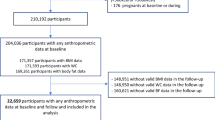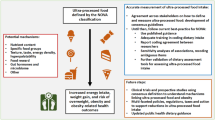Abstract
Background
The role of dietary Glycemic Index (GI), independently of fiber intake, in modulating cardiovascular disease (CVD) risk among non-diabetic individuals has not been fully elucidated.
Objective
To evaluate the effects of a low- versus a high-GI diet, based on a Mediterranean dietary pattern, on cardiometabolic risk factors in individuals at high CVD risk, participating in the MEDGI-Carb intervention study.
Subjects and methods
160 individuals, aged 30–69 years, BMI 25–37 kg/m2, with a waist circumference >102 cm (males) or >88 cm (females) and one feature of the metabolic syndrome, participated in a multi-national (Italy, Sweden, USA) randomized controlled parallel group trial. Participants were assigned to a low GI (< 55) or high-GI MedDiet ( > 70) for 12 weeks. The diets were isoenergetic and similar for available carbohydrate (270 g/d) and fiber (35 g/d) content. Fasting metabolic parameters were evaluated in the whole cohort, while an 8-h triglyceride profile (after standard breakfast and lunch) was evaluated only in the Italian cohort.
Results
Blood pressure and most fasting metabolic parameters improved at the end of the dietary intervention (time effect, p < 0.05 for all); however, no differences were observed between the low- and the high-GI MedDiet groups (time x group effect; p > 0.05 for all). Conversely, the low-GI diet, compared with high-GI diet, significantly reduced the 8-h triglyceride profile (p < 0.017, time*group effect) that was measured only in the Italian cohort. However, it induced a reduction of plasma triglycerides after lunch (tAUC) that was of only borderline statistically significance (p = 0.065).
Conclusions
Consuming a low-GI in comparison with a high-GI MedDiet does not differentially affect the major cardiometabolic risk factors at fasting in individuals at increased cardiometabolic risk. Conversely, it could reduce postprandial plasma triglycerides.
Clinical trial registry number
NCT03410719, (https://clinicaltrials.gov).

Similar content being viewed by others
Data availability
Additional data are available from the corresponding author on reasonable request.
References
Grundy SM, Brewer HB Jr, Cleeman JI, Smith SC Jr, Lenfant C. Definition of metabolic syndrome: report of the National Heart, Lung, and Blood Institute/American Heart Association conference on scientific issues related to definition. Circulation. 2004;109:433–8.
Guembe MJ, Fernandez-Lazaro CI, Sayon-Orea C, Toledo E, Moreno-Iribas C, RIVANA Study Investigators. Risk for cardiovascular disease associated with metabolic syndrome and its components: a 13-year prospective study in the RIVANA cohort. Cardiovasc Diabetol. 2020;19:195. https://doi.org/10.1186/s12933-020-01166-6
Xu J, Murphy SL, Kockanek KD, Arias E. Mortality in the United States, 2018. NCHS Data Brief. 2020;355:1–8.
Cardiovascular Diseases (CVDs). Available online: https://www.who.int/news-room/fact-sheets/detail/cardiovascular-diseases-(cvds) (accessed on 18 January 2023).
Sofi F, Abbate R, Gensini GF, Casini A. Accruing evidence on benefits of adherence to the Mediterranean diet on health: an updated systematic review and meta-analysis. Am J Clin Nutr. 2010;92:1189–96.
Zeraattalab-Motlagh S, Jayedi A, Shab-Bidar S. Mediterranean dietary pattern and the risk of type 2 diabetes: a systematic review and dose-response meta-analysis of prospective cohort studies. Eur J Nutr. 2022;61:1735–48.
Grosso G, Marventano S, Yang J, Micek A, Pajak A, Scalfi L, et al. A comprehensive meta-analysis on evidence of Mediterranean diet and cardiovascular disease: are individual components equal? Crit Rev Food Sci Nutr. 2017;57:3218–32.
Salas-Salvadó J, Becerra-Tomás N, García-Gavilán JF, Bulló M, Barrubés L. Mediterranean diet and cardiovascular disease prevention: what do we know? Prog Cardiovasc Dis. 2018;61:62–7.
Gopinath B, Flood VM, Rochtchina E, Baur LA, Smith W, Mitchell P. Influence of high glycemic index and glycemic load diets on blood pressure during adolescence. Hypertension. 2012;59:1272–7.
Ma XY, Liu JP, Song ZY. Glycemic load, glycemic index and risk of cardiovascular diseases: meta-analyses of prospective studies. Atherosclerosis. 2012;223:491–6.
Mirrahimi A, Chiavaroli L, Srichaikul K, Augustin LS, Sievenpiper JL, Kendall CW, et al. The role of glycemic index and glycemic load in cardiovascular disease and its risk factors: a review of the recent literature. Curr Atheroscler Rep. 2014;16:381. 16–18
Evans CE, Greenwood DC, Threapleton DE, Gale CP, Cleghorn CL, Burley VJ. Glycemic index, glycemic load, and blood pressure: a systematic review and meta-analysis of randomized controlled trials. Am J Clin Nutr. 2017;105:1176–90.
Clar C, Al-Khudairy L, Loveman E, Kelly SAM, Hartley L, Flowers N, et al. Low glycaemic index diets for the prevention of cardiovascular disease. Cochrane Database Syst Rev. 2017, Issue 7. Art. No.: CD004467. https://doi.org/10.1002/14651858.CD004467.
Frost G, Leeds A, Trew G, Margara R, Dornhorst A. Insulin sensitivity in women at risk of coronary heart disease and the effect of a low glycemic diet. Metabolism. 1998;47:1245–51.
Sloth B, Krog-Mikkelsen I, Flint A, Tetens I, Björck I, Vinoy S, et al. No difference in body weight decrease between a low-glycemic-index and a high-glycemic-index diet but reduced LDL cholesterol after 10-wk ad libitum intake of the low-glycemic-index diet. Am J Clin Nutr. 2004;80:337–47.
Ebbeling CB, Leidig MM, Sinclair KB, Seger-Shippee LG, Feldman HA, Ludwig DS. Effects of an ad libitum low-glycemic load diet on cardiovascular disease risk factors in obese young adults. Am J Clin Nutr. 2005;81:976–82.
Shikany JM, Phadke RP, Redden DT, Gower BA. Effects of low- and high-glycemic index/glycemic load diets on coronary heart disease risk factors in overweight/obese men. Metabolism. 2009;58:1793–801.
Sacks FM, Carey VJ, Anderson CA, Miller ER 3rd, Copeland T, Charleston J, et al. Effects of high vs low glycemic index of dietary carbohydrate on cardiovascular disease risk factors and insulin sensitivity: the OmniCarb randomized clinical trial. JAMA. 2014;312:2531–41. https://doi.org/10.1001/jama.2014.16658
Zilversmit DB. A proposal linking atherogenesis to the interaction of endothelial lipoprotein lipase with triglyceride-rich lipoproteins. Circ Res. 1973;33:633–8.
Nordestgaard BG, Benn M, Schnohr P, Tybjaerg-Hansen A. Nonfasting triglycerides and risk of myocardial infarction, ischemic heart disease, and death in men and women. JAMA. 2007;298:299–308.
Lambadiari V, Korakas E, Tsimihodimos V. The impact of dietary glycemic index and glycemic load on postprandial lipid kinetics, dyslipidemia and cardiovascular risk. Nutrients. 2020;12:2204.
Bergia RE, Giacco R, Hjorth T, Biskup I, Zhu W, Costabile G, et al. Differential glycemic effects of low- versus high-glycemic index Mediterranean-style eating patterns in adults at risk for type 2 diabetes: the MEDGI-carb randomized controlled trial. Nutrients. 2022;14:706.
Bergia RE, Biskup I, Giacco R, Costabile G, Gray S, Wright A, et al. The MEDGICarb-study: design of a multi-center randomized controlled trial to determine the differential health-promoting effects of low- and high-glycemic index Mediterranean-style eating patterns. Contemp Clin Trials Commun. 2020;19:100640.
Matthews DR, Hosker JP, Rudenski AS, Naylor BA, Treacher DF, Turner RC. Homeostasis model assessment: insulin-resistance and B-cell function from fasting plasma glucose and insulin concentrations in men. Diabetologia. 1985;28:412–9.
Giacco R, Costabile G, Della Pepa G, Anniballi G, Griffo E, Mangione A, et al. A whole-grain cereal-based diet lowers postprandial plasma insulin and triglyceride levels in individuals with metabolic syndrome. Nutr Metab Cardiovasc Dis. 2014;24:837–44.
Blonde L, Umpierrez GE, Reddy SS, McGill JB, Berga SL, Bush M, et al. American Association of Clinical Endocrinology Clinical Practice Guideline: developing a diabetes mellitus comprehensive care plan-2022 update. Endocr Pr. 2022;28:923–1049.
Alberti KG, Zimmet P, Shaw J. Metabolic syndrome-a new world-wide definition. A consensus statement from the international diabetes federation. Diabet Med. 2006;23:469–80.
Davidson MB. Historical review of the diagnosis of prediabetes/intermediate hyperglycemia: case for the international criteria. Diabetes Res Clin Pr. 2022;185:109219.
Bansal S, Buring JE, Rifai N, Mora S, Sacks FM, Ridker PM. Fasting compared with nonfasting triglycerides and risk of cardiovascular events in women. JAMA. 2007;298:309–16.
Wolever TM, Gibbs AL, Chiasson J-L, Connelly PW, Josse RG, Leiter LA, et al. Altering source or amount of dietary carbohydrate has acute and chronic effects on postprandial glucose and triglycerides in type 2 diabetes: Canadian trial of Carbohydrates in Diabetes (CCD). Nutr Metab Cardiovasc Dis. 2013;23:227–34.
Browning JD, Horton JD. Molecular mediators of hepatic steatosis and liver injury. J Clin Invest. 2004;114:147–52.
Adiels M, Borén J, Caslake MJ, Stewart P, Soro A, Westerbacka J, et al. Overproduction of VLDL1 driven by hyperglycemia is a dominant feature of diabetic dyslipidemia. Arterioscler Thromb Vasc Biol. 2005;25:1697–703.
Parker A, Kim Y. The effect of low glycemic index and glycemic load diets on hepatic fat mass, insulin resistance, and blood lipid panels in individuals with nonalcoholic fatty liver disease. Metab Syndr Relat Disord. 2019;17:389–96.
Acknowledgements
WWC, GR and RL served as co-principal investigators. The study authors would like to thank all study participants who volunteered their valuable time and attention. We thank Barilla G&R F.lli. SpA, Parma, Italy for providing some of the cereal products for the study participants.
Funding
This research was funded by Barilla International and Barilla USA. The industry was not involved in the study hypothesis/design, execution, analysis, or interpretation.
Author information
Authors and Affiliations
Contributions
Conceptualization, RG, GR, RL and WWC; methodology, GC, REB, WWC, RL and GR; formal analysis, GC; investigation, RG, GC, REB and MV; resources, WWC, RL and GR; data curation, GC, MV, REB and RG; writing—original draft preparation, GC and RG; writing—review and editing, GC, RG, REB, RL and GR; supervision, GR, RL and WWC; project administration, REB, RG, GC and MV; funding acquisition, GR, RL and WWC. All authors have read and agreed to the published version of the manuscript.
Corresponding author
Ethics declarations
Competing interests
Gabriele Riccardi is member of the Health and Wellbeing Advisory Board of the Barilla company: remuneration for this activity goes to his University Department. All other authors declare no conflict of interest.
Informed consent
Informed consent was obtained from all subjects involved in the study.
Additional information
Publisher’s note Springer Nature remains neutral with regard to jurisdictional claims in published maps and institutional affiliations.
Supplementary information
Rights and permissions
Springer Nature or its licensor (e.g. a society or other partner) holds exclusive rights to this article under a publishing agreement with the author(s) or other rightsholder(s); author self-archiving of the accepted manuscript version of this article is solely governed by the terms of such publishing agreement and applicable law.
About this article
Cite this article
Costabile, G., Bergia, R.E., Vitale, M. et al. Effects on cardiovascular risk factors of a low- vs high-glycemic index Mediterranean diet in high cardiometabolic risk individuals: the MEDGI-Carb study. Eur J Clin Nutr (2024). https://doi.org/10.1038/s41430-024-01406-y
Received:
Revised:
Accepted:
Published:
DOI: https://doi.org/10.1038/s41430-024-01406-y
- Springer Nature Limited




